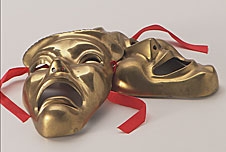
Feifei: Ah! Finally you are here, Neil! I was starting to feel silly waiting for you here in the queue, in front of the theatre. Let's go in!
菲菲:啊!你終于來了,尼爾!我都已經(jīng)開始覺得站在劇院前的隊伍里等你很傻了。我們走吧!
Neil: Calm down, Feifei. You are too excited!
尼爾:冷靜,菲菲。你太興奮了!
Feifei: I've been waiting for this moment for months. I love this play! My favourite actors are in it and it is so full of drama! I'm so excited! Let's go!
菲菲:我等這個時刻已經(jīng)等了幾個月了。我超愛這個演出!我最愛的演員在里面,而且它充滿了戲劇性!我太激動了!我們走!
Neil: OK... right... the tickets...the tickets... Oh! I can't find them!
尼爾:好的...票...票...哦!我找不到它們了!
Feifei: What? What do you mean? Stop joking!
菲菲:什么?你說什么?不要開玩笑!
Neil: I'm not joking! I can't find them anywhere!
尼爾:我沒有開玩笑!我哪也找不到了!
Feifei: How could you have lost them!? How could you do this to me!?I'm so disappointed!
菲菲:你怎么能丟了票?我怎么能這樣對我?我太失望了!
Woman 1: Oh! Look, she is hysterical! Do you think she will slap him?
女1:哦!看,她好激動啊!你覺得她會給他一耳光嗎?
Woman 2: He is really inconsiderate!
女2:他實在是太不小心了!
Neil: Feifei, don't make a scene!
尼爾:菲菲,不要當眾出丑了!
Feifei: I have to make a scene because you lost the tickets and we can't get into the theatre to watch a real scene!
菲菲:我必須要當眾出丑因為你弄丟了票,我們不能進劇場看現(xiàn)場表演了!
Neil: 'To make a scene' is an expression we use in English to describe when somebody causes a disturbance or is loud in public. Often it's embarrassing. Let's hear some examples of how this expression is used:I will never go back to the restaurant again. Last night Jane made a scene when the waiter brought fish instead of the beef she had ordered! It was very embarrassing.Don't make a scene, Alan! We are not married yet and I can go out with whoever I like - including your best friend!
尼爾:“當眾出丑”是英語中一個短語用來形容某人打擾到眾人或當眾喧嘩。一般都很尷尬。讓我們來聽幾個關(guān)于這個短語用法的例子吧:我再也不會去那個餐廳了。昨天晚上侍者端上魚而不是簡點的牛肉以后,簡當眾出丑了!這很丟人。不要當眾出丑,艾倫!我們還沒有結(jié)婚,我不能和任何我喜歡的人出去,包括你最好的朋友!
Feifei: I'm sorry, Neil. I didn't mean to embarrass you or cause a disturbance. But I was looking forward to this! What's this taxi driver doing here?
菲菲:對不起,尼爾。我不想讓你尷尬或擾亂秩序的。但我太期待這個了!那個出租車司機在干什么呢?
Taxi driver: There you are, sir. I found these tickets on the back seat of my taxi. They might have slipped from your pocket.
出租車司機:你在這里,先生。我在出租車的后座上找到了這些票。它們可能從你的兜里掉出來了。
Neil: Oh, thank you so much! Feifei was really angry. Now, the drama is over!
尼爾:哦,太感謝您了!菲菲剛才特別生氣。現(xiàn)在,噩夢終于結(jié)束了!
Feifei: You mean the drama is about to start! You're the best taxi driver in the world! And you are my very good friend, Neil! You are my best friend ever!
菲菲:你是指演出馬上要開始了吧!您是全世界最好的司機!而且你是非常好的朋友,尼爾!你是我最好的朋友!
Neil: Thank you, Feifei. You are my best friend too! I'm glad we can watch the play together!
尼爾:謝謝你,菲菲。你也是我最好的朋友!我很開心我們能一起看演出!
Woman 1: Look. Isn't it marvellous? They are friends again!
女1:看,這難道不神奇嗎?他們又成為好朋友了!
Woman 2: Don't you just love a happy ending?
女2:你不就是愛圓滿的結(jié)局嗎?
Feifei: Let's go in. Oh, I'm so happy! Bye.
菲菲:我們進去吧。哦,我太開心了!再見。
Neil: Bye.
尼爾:再見。











